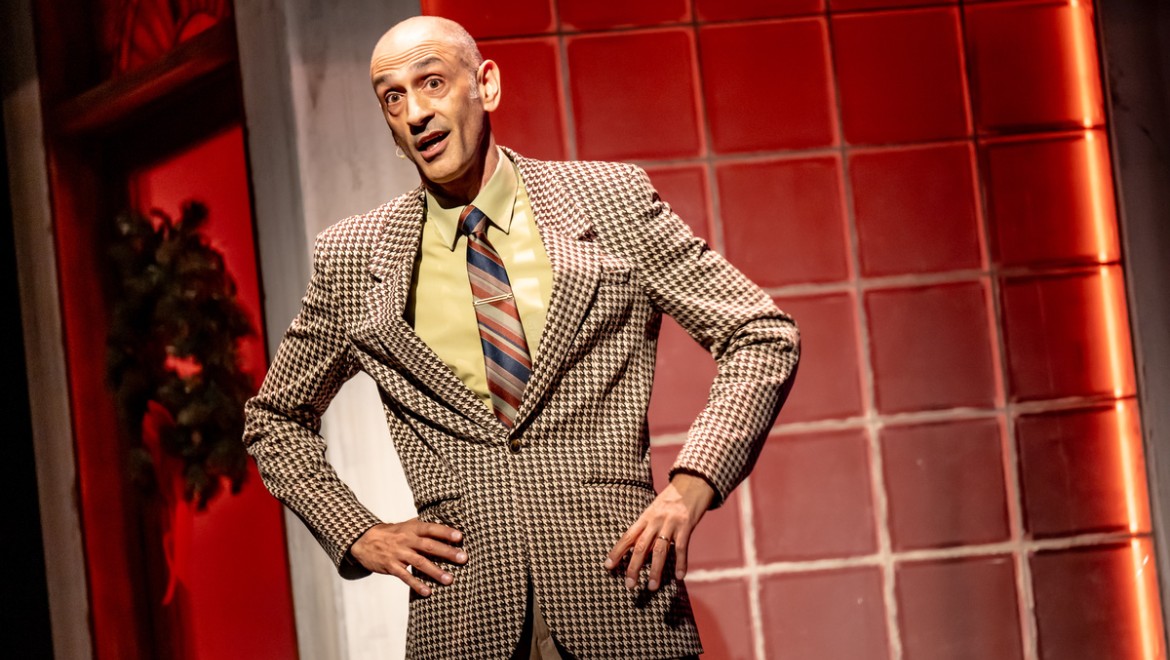In the Spotlight:
Omar Alex Khan from Million Dollar Quartet


Omar Alex Khan as Sam Phillips in Million Dollar Quartet. Photo by Dahlia Katz.
Elvis. Johnny. Jerry Lee. Carl. These are the names on the marquee. Sam Phillips. This is the man with his name on each of their records. Sam Phillips signed, produced, and in many ways “made” the names that topped the charts in the 1950s and 1960s, and that’s why he’s known as the Father of Rock ‘n’ Roll.
Winnipeg’s Omar Alex Khan brings Sun Records founder, Sam Phillips, to life on the Grand Theatre’s Spriet Stage in Million Dollar Quartet. In real life, Omar plays the drums, juggles, and has one heck of a talent for whistling, but in this show he’s the man-behind-the-music. To learn more about Omar, his career as an actor, and the rock ‘n’ roll icon that he portrays on stage, we asked Omar Alex Khan ten questions. Here’s what he had to say:
Grand Theatre: What would you love for audiences to take away from Million Dollar Quartet?
Omar Alex Khan: I’d love for them to walk out of the theatre having been moved by the music. Also, carrying with them the idea that if you believe in yourself, you can accomplish good things. Sounds trite and simple, maybe, but I think it has merit.
GT: Have you learned any interesting ways that the production differs from that original night in Sun Records Studio?
OAK: The truth is that the script plays a bit loose with the facts. For example: Elvis’s girlfriend was indeed present, but her name wasn’t Dyanne and she wasn’t a singer. The way the iconic photo comes to be taken in the show is not how it happened in real life. There was also a recording engineer present in the studio but there is no such character in the show. The show is truly a “fictionalized” account.
GT: Any theories why Sam Phillips didn’t release the tapes for the Million Dollar Quartet session?
OAK: Perhaps initially Phillips was reluctant because of the disorganized and unpolished nature of the performances, although that’s pretty typical of a bunch of people just messing about in the studio. There is evidence, including interviews with Sam Phillips, that the tapes were lost for many years. Phillips sold Sun in 1969 and the tapes were discovered over the course of many years by the new owner, Shelby Singleton, and the British label Charly, whom Singleton worked with to reissue much of Sun’s old catalogue.
GT: Welcome back to the Grand! You’ve performed here before, and at so many incredible theatres. What sets the Grand apart?
OAK: Great to be back! Everyone is always very welcoming, respectful, helpful and accommodating. And I really love the facilities here. The dressing rooms are spacious and comfortable, and the green room is inviting and a great environment for socializing. The new renos look fantastic! And I always love performing in the gorgeous auditorium.
GT: Tell us about a day at the Grand Theatre for you.
OAK: It’s a work day like any other - work, breaks, socializing, team problem solving, laughing, more socializing, hopefully more laughing! I usually settle in with a coffee and some chit-chat before getting down to business. I always get out of the rehearsal hall or auditorium on a break, just to reset and refresh for the next part of the day.
GT: Sam Phillips was significantly influenced by Black musicians, how does this come through in the production?
OAK: In the production, Sam talks specifically about finding a white singer who can capture the energy of the great Black performers. There is a section where Chuck Berry is given kudos for his song writing and performance skills. There is a Bo Diddley song in the show, and many of the songs by the Quartet were originally written and recorded by Black artists.
GT: If you could make your own dream Million Dollar Quartet superstar ensemble, who would you include?
OAK: That’s a tough question! Here goes, maybe a bit of a weird list, in no particular order: David Bowie, Beyoncé, Bruce Springsteen, Prince. Ask me tomorrow and my answer will probably be totally different!
GT: How does your preparation for Sam Phillips differ from past roles?
OAK: I watched and listened to a lot of his old interviews to get a foundation for his southern American accent. Much has been written about Sam and Sun, and I combed through some of that. A lot of that information doesn’t necessarily figure in the production, but I like to know a bit about the real-life figures that I portray.
GT: What scenes in the production do you think will stand out to the audience?
OAK: There’s a great rockin’ concert at the end of the show that will leave people heading out of the theatre on a high. Aside from the concert there are also plenty of other fantastic song performances. There’s also an emotional scene when Sam finds out about the future paths that Johnny Cash and Carl Perkins have chosen for themselves.
GT: What do you think Sam Phillips would like us to know about him? What would you like us all to know about Sam?
OAK: At heart, Sam was a business owner, and like most, if not all, business owners, he was most concerned with the bottom line. But even though he wanted to capitalize on trends and turn a profit, I believe that he did care for his artists and wanted the best for them. That was his struggle - balancing the needs of his artists while still being able to run a viable and successful business.
Million Dollar Quartet plays through to May 11 on the Grand Theatre Spriet Stage. For tickets, information about enhancing your experience, and other behind-the-scenes moments, click here.
.png)



